The Champions of Winter Camping
We are the champions of winter camping in Iceland. There are several reasons for that statement, but our Insulation and Heating approach makes CampEasy genuinely unique in our camper design. We put a lot of effort into ensuring that our campers are warm, even during the coldest winter months. So if you are asking yourself how to stay warm in a camper in the winter, we have the answers!
The Equipment
Firstly, we use the world-leading Webasto heating system. We’re removing the main bottleneck by fitting two large additional batteries in the rear cabin. Mixed with the more powerful alternator and a more powerful main engine battery, you are guaranteed 8-10 hours of powerful heating. We insulate the campers properly and make sure none of that heat we’ve worked so hard to produce escapes the cabin via cold metals. All of our NEW Easy Campervan line also has 230V connection, which gives you an unlimited amount of heating if you rent electricity at a campsite and connect the campervan with provided cables. We design the campers to be power independent and charge your batteries as you drive. Combine all this with the extra floor mats for the wet, extensive safety and tracking equipment via the Easy Guide, and brand new winter tires, and you get the champion. Now you have the Winter Camper.
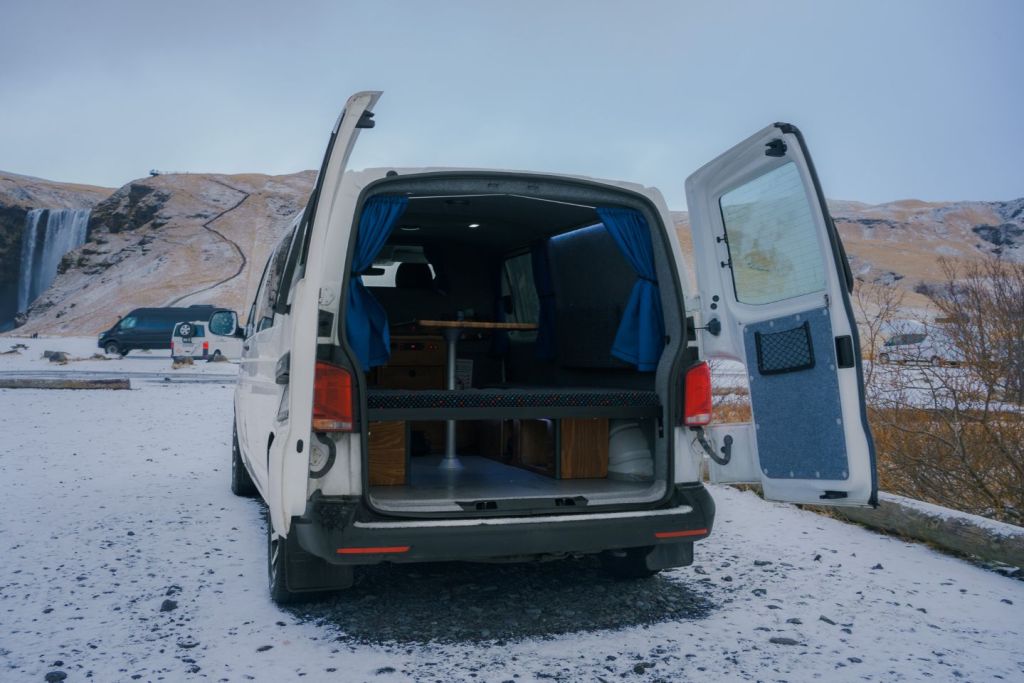
Explorer Training
Secondly, the explorer training; when you arrive at CampEasy to pick up your winter camper, you get properly informed and fed with tips and tricks. The orientation takes up to an hour. However, you are welcome to take your time and ask questions until you’re confident you have what you need. We also design our campers so that you can do everything from the inside of the warm cabin. Cooking, cleaning, washing up, dining, etc. Even re-filling your water supply is done from the inside.
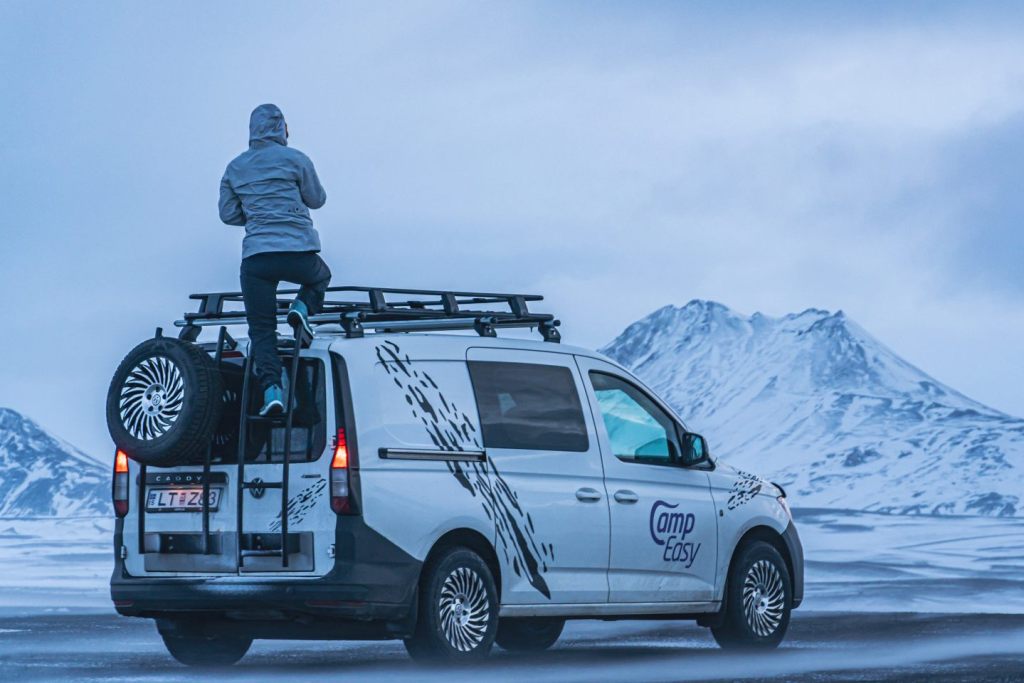
Travel With Confidence
Thirdly, you can use the Easy Guide tablet provided with each rental. In addition to having the highest-rated, coziest, and best-equipped campervans in Iceland, CampEasy team members are available to chat directly. Should you need advice, have questions, or need non-urgent assistance during business hours. The Easy Guide tablet will also send weather warnings based on the location of the campervan. In plus, it allows you to check the Icelandic weather forecast and road conditions in real-time.
We operate an emergency line outside of hours and offer a 24-hour roadside assistance service.
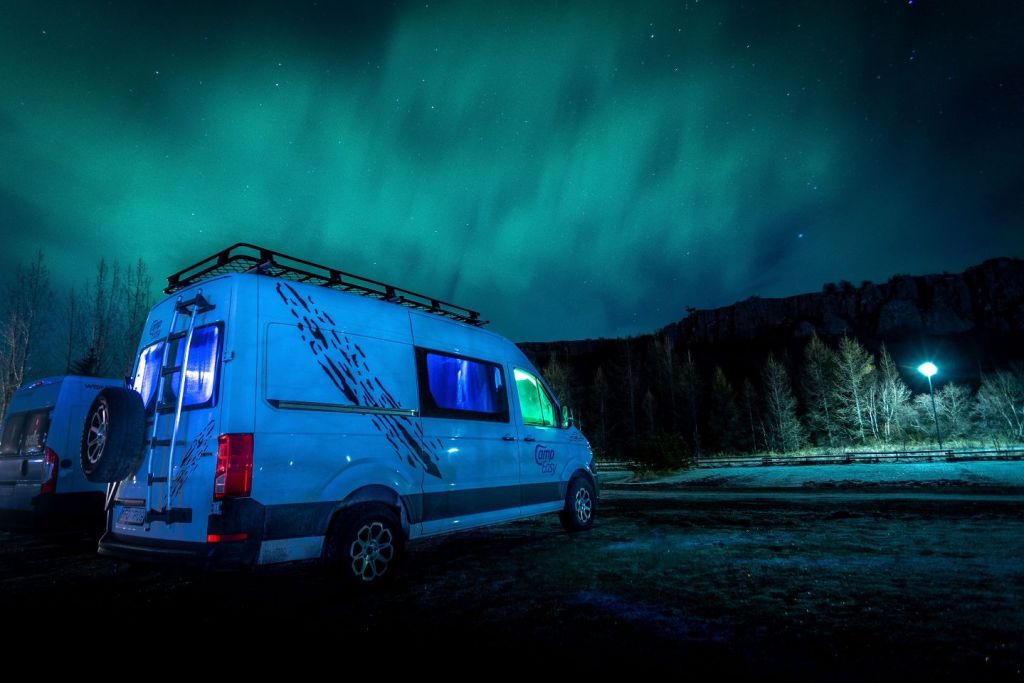
Safety & Comfort
The Biggest Winter Differences CampEasy Offers
All-Night Heating System
Webasto heating systems are dominant in this market. We only equip our campers with the best.
But the main bottleneck is actually the electrical charge needed to keep the system running for long hours. We’ve addressed that with multiple batteries in the rear, along with insulation like you wouldn’t believe, and special modifications to the heating system intake to account for snowstorms or any climate for that matter.
Triple Battery Setup
Power generation and power storage were the most significant challenges as we started designing campers made for any climate. We looked into solar panels and other solutions that did not yield good results. The combination that did the trick was a more powerful alternator, larger batteries, and more of them. We now have three large batteries in every camper. We can guarantee heating and functionality for 8-10 hours (or more) without having to start your engine or plugging the camper to campsite electricity.
Fully Insulated
The full insulation approach has proven very effective in multiple ways. We discovered that a camper with thick plates of wool behind every carpet layer made the camper more comfortable in winter (obviously) but improved on it in multiple other ways. We reduced ambient noise at campsites, road noises became less noticeable, and condensation problems were less prevalent. Having carpets on every layer is also crucial, as any exposed metal becomes a popsicle during the winter, regardless of how powerful the heating is.
Built-in Easy Guide Tablet
Tracking
Lost? No worries, we can tell you where you are.
Messaging
Chat Directly with CampEasy staff during the day.
Live Warnings
When we see trouble ahead, we warn you based on location.
ICE-SAR Connection
Icelandic Search and Rescue Network warnings appear directly.
Weather Monitoring
Easy access to weather forecasts and detailed weather information.
Road Monitoring
Easy access to road status and detailed road conditions.
Wifi
Always connected via the Easy Guide wifi.
Take Pictures
For easier communications, take or receive a picture from us.
Free Extras For your Comfort
Free Extra Duvet
Things are just better with an extra duvet on hand.
Free Blanket
The Little things matter.
Trusted Icelandic Resources
We always like to say: be alert, but not anxious. In case of any problems, you can always contact CampEasy. But it’s also important to know what other official resources you can count on maybe even before you start your trip.
Numbers
112 – Official Emergency Number in Iceland (you can call from any phone, no matter the network)
1777 – Information about the road from the Icelandic Road and Coastal Administration
Websites
isavia.is – All the airports in Iceland with all the flight information provided.
road.is – The website of Icelandic Road and Coastal Administration – you will find here road conditions and webcam to prepare better for your trip.
safetravel.is – Best website for travel conditions and other important alerts. You can also submit a travel plan and they will check on you in case something goes wrong.
112.is – The Emergency Number has a website as well.
safe.is – Best website for information regarding driving in Iceland. In plus, they still have a little test for you to try your Icelandic road knowledge.
vedur.is – The most used weather website. It has comprehensive information about weather and more: Aurora forecast, earthquake info, alerts, avalanches, etc.
gmsbensin.is – While it’s not an official database, it is an updated surveyed fuel list with gas stations around Iceland. The prices can vary quite a lot so it’s worth checking out for planning your fueling.
windy.com – If you want to check out wind prediction, this website is perfect. Also, guess the colors you’ll mostly see in Iceland in winter?
vatnajokulsthjodgardur.is – On the Vatnajokull National Park you can find information about the road conditions and much more.
Keflavik Airport – A way to double-check your flight is to get alerts directly from the airport.
SIM cards
Nova and Simminn – Icelandic phone companies to buy prepaid phone cards.
Vodafone – International phone company to buy a prepaid phone card.
You can purchase a SIM card at every gas station and even in supermarkets. But make sure your phone is unlocked before your trip.
Apps
112 Iceland app – The Official Icelandic Emergency has also an app. You can contact them without calling so make sure you have it on your phone: Android or iOS.
Nova App – You will find in the app a lot of 2 for 1 offers for restaurants, bars, and more.
Open Campsites in Winter
CampEasy has been working to increase overnight locations for campers for several years. We provide updated information about camping locations in the included tablet. To make sure our details on what campsites are open and what kind of facility access they provide in the winter months are correct, we call everyone regularly.
We live in Iceland; our experience as travelers around Iceland brings you all the knowledge you need for a road trip around our little island. Rent your winter camper with us. You won’t regret it.
You can find here even more maps. The one above is excellent for research before you arrive, but you also get a full list of all open campsites in your included Easy Guide Tablet.
Other Amenities During the Winter Months
You may be surprised to find that amenities are available throughout the entire island in the wintertime. Although not as numerous as in the summertime, you will still be able to find restrooms, showers, and laundry facilities by using the Easy Guide tablet provided with each rental.
Campsites that are open during the winter generally have their facilities available.
Gas stations around Iceland are open all year round. They have restrooms, and almost every town in Iceland has a geothermal swimming pool or hot tub, which is a great place to soak and use the showers and changing rooms.
Winter Camping – Pros
Privacy
You have more places to yourself as fewer tourists visit during the winter time. Many of the waterfalls, scenic viewpoints, and National Parks will be deserted. The campsites are quieter and so easy to just plan as you go.
On a budget
Off-season comes with cheaper prices. Including at the campsites!
Winter Activities
Northern Lights
Northern Lights hunting will be mostly undisturbed. And it’s only during the winter months when you can be delighted by Aurora Borealis.
Winter Tours
Iceland offers an abundance of activities to do during winter time and we talk more about them below. However, glacier tours and horse riding are fantastic.
Arctic Landscape
The farm animals are not free-range during the winter and will not be standing on the roads; however, majestic Icelandic reindeers roam the Eastfjords in winter. Iceland changes completely during snowy winter. This is the main reason we recommend giving wintery Iceland a chance even if you’ve seen it during summer.
Conclusion
Fiery pink sunsets that last for hours (toward the end of winter), quiet campsites, a beautiful white winter wonderland for photography lovers, and best of all, cheaper pricing due to the off-season!
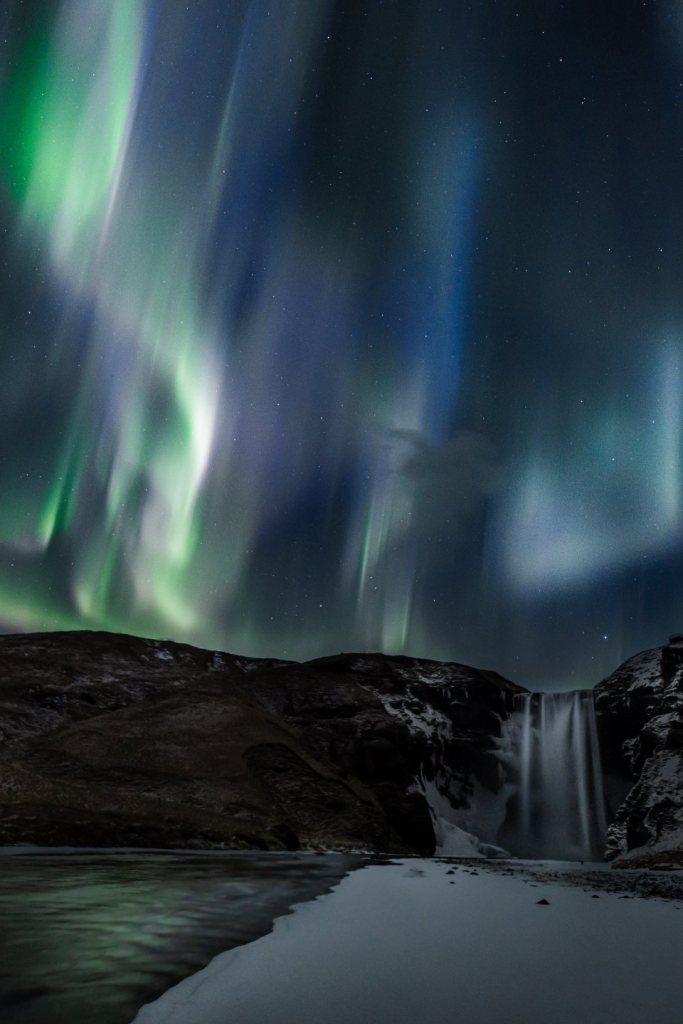
Winter Camping – Cons
Dangerous Weather
Strong Winds
Winds can be a hazard and they are not to mess around in the depths of a storm. Remember to hold the door when exiting the car and park your camper against the wind. Like that the door will just close other than fly away. And that’s not a joke!
Blocked Roads
The winter weather can cause roads to be blocked. Which means you might be stuck for a few nights. But at least you could cozy up in your campervan.
No Highlands
You will have no access to the Icelandic Highlands until the summertime, and the lambing season in Iceland doesn’t start until May.
No Summer Animals
Speaking of animals, you will miss seeing the puffins that visit from May to July and whales from April to October. But don’t worry they won’t miss you.
Darkness
Daylight can be minimal depending on when you decide to visit. For more advice, read below.
Conclusion
Winter in Iceland is very unpredictable. The winter of 2020-2021 was one of the driest in Iceland. While 2021-2022 was one of the snowiest. So if you love a (little) challenge and trust we’ll be there for you each moment, give winter in Iceland a chance.
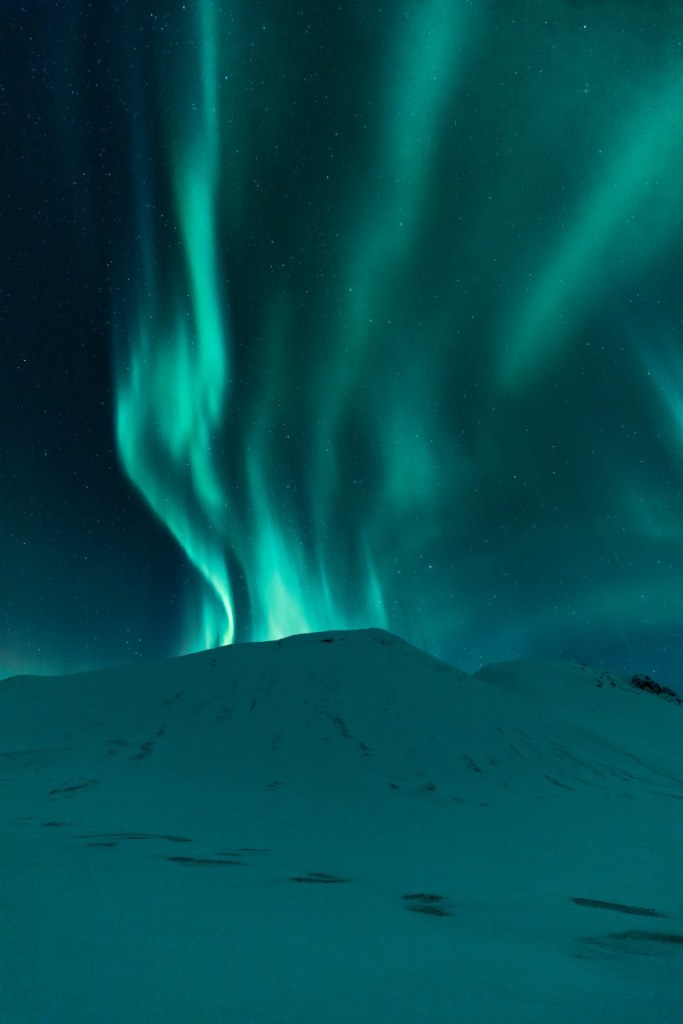
Planning Your Winter Trip
The best way to plan for a winter trip around Iceland is not to have a plan but to still have a good idea of what options lay ahead. We recommend taking two weeks or more if you want to do the whole Ring Road, and instead of a timeline, focus on points you want to reach.
If you make a plan, make one for a clockwise route and another counterclockwise. The weather can be temperamental and cause delays, so you want to be prepared with plenty of time. Direction-wise, you need to be flexible, as the weather may be fantastic in the North of Iceland. A storm may be brewing in the South, or vice-versa, and it’s best to make hay while the sun shines. Please take advantage of good weather when you see it. But also be aware the weather might change very fast.
We recommend checking the Icelandic weather forecast every day at www.vedur.is and the road webcams at www.road.is.
Your CampEasy Service Agent will be happy to advise on your itinerary. We are available to chat with you during your journey if you have any questions.
How To Pack for the Icelandic Winter
It goes without saying; that you will need to bring layers.
- insulated water- and windproof jacket
- warm fleece
- thermal long-sleeved to wear underneath
- waterproof pants with thermal tights
- tights
- warm woolen socks
- a good pair of boots
- a cozy scarf
- gloves
You should also consider using crampons, especially for icy days, and bring a swimsuit to enjoy the hot springs. You’ll need sunglasses during the glary winter days. You can check out the full CampEasy Road Trip Packing List for more ideas.
Winter Activities and Winter Toys
A winter road trip in Iceland does not mean you will be confined to your campervan. There are a lot of activities around the ring road and a lot of things to see and do. Winter is the perfect time to visit the famous glaciers and ice caves of the Icelandic South Coast.
For example, you can try a glacier walk or ice climbing. Wintertime is a great time to go on a snowmobiling tour, experience dogsledding, hunt for the northern lights, and soak in a natural hot tub or spring. Horse-riding is a year-round activity available all over Iceland.
You can visit the waterfalls with a dramatic frozen backdrop. The black sand beaches, glacier lagoon, mountain peaks, and volcanoes are all the more breathtaking when dusted with snow. The Golden Circle and Ring Road 1 are all open for business during winter- weather-dependent.
Icelandic Weather
Surprising to many is that Iceland isn’t very cold in the winter. The Gulf Stream evens out the temperature throughout the year, combined with the coastal nature of the island. Summer temperatures rarely rise above 17°C/63°F, and winter temperatures don’t often dip below -5°C/ 21°F. The snowfall is very unpredictable and varies a lot between seasons. We can have winters almost entirely without snow in some areas, and then there are the winters where the snow engulfs the entire country for months.
The wind is the most dangerous factor when driving on Icelandic roads. Although we do not get hurricanes as defined, we have experienced wind speeds double the criterion for hurricane-force winds. We share a more accurately dubbed a “polar low “or “Arctic depression. “These high-wind weather patterns are generally very short-lived, on average lasting no more than a day or two and often only a few hours. It lasts for such a short time, so it’s a crucial factor and dampens its effect on your trip, should you encounter it. But be warned, ignore the alerts, or proceed without care, and gales can easily blow your camper clean off the road.
The number one thing is regularly monitoring the reports and alerts on your tablet and slowing down when the wind picks up.
Below you’ll find a slider that categorizes every month by chances of northern lights, weather, daylight hours, etc. Check out the Northern Lights Guide for detailed information on the Northern Lights.
Events In Iceland in Winter
Iceland has several festivals during the wintertime. If you like film and music festivals, or other festivities, the Icelandic calendar is full of them. So here are a few:
In November, Iceland Airwaves is held and spans four days showcasing new music from Icelandic and international acts. One of the biggest music festivals held in Iceland since 1999.
December is Christmastime, and instead of Santa – Icelanders celebrate the 13 naughty Yule Lads who come from the mountains and leave gifts in children’s shoes. Christmas starts on the 24th in Iceland and is probably the most important national holiday. There are events all over the country, from market stalls (Jolaportið) to concerts.
New Year’s Eve is a big celebration for Icelanders, who buy massive fireworks to light up the skies throughout the night.
In January, Dark Music Days, a music festival, is held in the famous concert hall Harpa, downtown Reykjavik. This festival is held during the darkest part of winter and highlights contemporary Icelandic and international composers.
Reykjavik International Games is also held in January. Over 45 countries join in the mini-Olympics with over 3000 participants.
In February, the Winter Lights Festival is held in Reykjavik and features light and art installations all around the city.
And of course, we can’t forget the Bolludagur or Bun Day celebrated in February. For three days before the Easter lent starts, everyone eats until they explode. Not really but the soup, cream buns candy for children are the main heroes of the event.
In March, we have the Annual Icelandic Beer Festival, a 4-day celebration of Icelandic beer, which was only made legal in 1985.
13 Tips On Winter Travel In Iceland
1. Rent a four-wheel-drive vehicle (4×4).
It increases your vehicle control should you begin to slide or need to maneuver quickly. It also increases the vehicle’s weight, which results in better traction and reduces the wind’s impact. You’ll manage in a front-wheel-driven camper, but the 4×4 makes things easier.
2. Have a Paper Map for backup.
If all else fails, you will still have a map. We do not recommend using only your GPS navigation (Garmin or the like). It will often guide you towards the shortest route, which can as often as not be a mountain road.
3. Fill the tank when you see a gas station / Fill it when it reaches 50%.
Distances in Iceland aren’t very great by any stretch, but getting from A to B can take longer than expected, resulting in more fuel usage. The heating system is connected directly to your fuel tank and needs a bit during the night; it can cause problems even if the tank has less than 1/4 of fuel. It’s best to fill up when it reaches 50%. We recommend you take more than one Credit Card with you and know the PIN for each one. Everywhere accepts cards (almost), but nearly all of them require a pin. You also receive a fuel discount card from us, giving you a minimal discount on fuel and Wi-Fi access at N1 gas stations.
If you cannot get a chip and pin card from your bank, you can always purchase pre-paid cards at N1 stations in Reykjavík.
You should also keep in mind that if you choose the fill-up option on the pump, the machine will take a 25.000 ISK security deposit from your card and hold it for up to 48-72 hours, even though you pump gas for 10.000 ISK. If you have a daily withdrawal limit or limited funds, that can be a problem.
4. Maximize daylight hours.
The days aren’t very long in the winter this far north. At 66°N, during the winter solstice, the full day is around 2 hours and 45 minutes. In Reykjavík (further South, about 64°N), the day lasts approximately 4 hours when it’s the shortest. During the darkest months (December and January), you will only get a few hours of sun each day. The long twilight is a recipe for some fantastic photos, as the sunrise and sunsets last for a long time. Still, it also makes it trickier to navigate around the island.
5. Be flexible.
Flexibility is something we always recommend, summer or winter. The island is absolutely riddled with exciting things to see and do. We recommend you read up on what you want but keep your plans relaxed and follow the good weather. Don’t get hung up in one place and get in trouble forcing a journey you can’t handle. There will always be several fun alternatives.
6. Don’t return to Reykjavík only a few hours before your flight leaves.
We recommend you spend your last night in Reykjavík during high winter or very close to it. As mentioned above, the weather comes in quickly, and it departs just as quickly. If your path is blocked, it usually isn’t for more than a day or two, as the roads will be cleared and the weather will settle. So be back in Reykjavík or no more than a 30-minute drive away from it. There are plenty of campsites to choose from, which is an excellent way to avoid potential stress. It will feel more comfortable, and Reykjavík is worth staying for at least a night! The downtown Reykjavík campsite is open all year round.
7. Know how to change a flat tire.
Even though distances aren’t that great in Iceland, getting road assistance for a flat tire between towns can be expensive. Check out Youtube videos and maybe practice once before you arrive. Our Easy Clever and Easy Viking come with a mounted rear spare tire on the back, making the tire change easier. All our other campers have a spare tire mounted underneath, in the rear. Note that if you blow a tire, you must have it fixed or replaced at your expense.
8. Drive slower than the speed limit.
Even if the speed limit is 90kph/56mph, you don’t have to drive at 90kph/56mph. In fact, in some cases, that could be very dangerous. Don’t let the local drivers push you to go faster. If you have a car tailing you, you can put on your blink light (turn signal) to the right to indicate that you want him to pass. Make sure you don’t give such an indication when there is traffic coming in the opposite direction or any danger on the road ahead. The turn signal to the right is also a message to the tailing driver that it’s safe to pass.
9. Clear all snow from every window and mirror before driving and clear the roof.
This is important. It may not seem like a big deal when it’s bright to have a rear window covered or a rear side window. Still, complete visibility makes the driving more comfortable. Not to mention when it gets darker, you want to be able to see all that you possibly can.
10. Beware of black ice.
Ice on roads in winter isn’t always visible. It can look clear but be covered with a thin layer of ice.
11. Find safe places to stop your vehicle.
Stopping on the side of the road or the road itself, especially when there’s ice or snow, is dangerous. You might not be spotted by passing vehicles until too late due to the lack of traction. Stopping can take a while on icy roads.
12. Always wear your seatbelt and turn on your headlights.
It is illegal not to use seat belts in Iceland, both for the driver and passengers. We also require all vehicles to have their headlights turned on at any time of the day. Buckle up and turn your lights on!
13. Don’t cram too much into your schedule or be in a hurry.
The days are short, and you won’t be able to see it all anyway. Take your time and enjoy the adventure. In a safe way! 😉
What Others Say
But hey, don’t take our word for it! See what others have to say about winter camping in Iceland. And like always, we are here for you to answer any other questions you might have.
- Lonely Planet – Getting Around Iceland
- Lonely Planet – Best Time to Travel Iceland
- Fresh Off the Grid – Planning an Iceland Camper Van Road Trip
- That Travelista – 10 Reasons to Travel Iceland (by Camper Van) in Winter
- Mountains and Mounthills – The Ultimate 10 Day Guide to Iceland
- The Global Wizards – Driving in Winter in Iceland: the Complete Guide
- Earth’s Magical Places – Incredible Iceland 7 Day Itinerary
- Full Suitcase – What to Wear in Iceland in Winter
- Hallo Island – Rent a Camper in Iceland: Tips & Places to Go
So, Is Winter Camping Something for You?
Check out our prices for a winter rental. You’ll love our offers.
4 Excellent CampEasy Exclusives
-
Next Level GPSIn every camper, there is a tablet with loads of features developed to make your camper trip easier. Turn-by-turn navigation, weather, road conditions, POI nearby, chat to CampEasy and more.
-
No False Damage ChargesWe take 8 high-resolution photos with a hardcoded time stamp, of each camper, from every angle before you pick it up. This way, we will never charge you for damages you did not cause. We also do a full inspection when you return, eliminating any late or unexplained bills.
-
Built-in MessagingThis is a big one. We offer a chat service through the tablet directly with us. Extremely helpful for small inquiries, instructions and putting minds at ease.
-
Manage BookingAfter you book, you can log in to your booking in the top right corner, and edit your dates, extras, activities, itinerary, transportation from airport, vehicle type and more. You can also check out the weather forecast, and road conditions.
